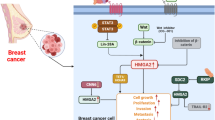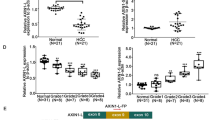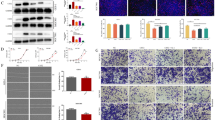Abstract
3-Hydroxy-3-methylglutaryl reductase degradation (HRD1) is an E3 ubiquitin ligase that functions by promoting degradation of misfolded proteins in processes such as embryogenesis and rheumatoid arthritis. However, little is known about the role of HRD1 in cancer. The aim of the present study was to investigate the expression pattern and functions of HRD1 in human colon cancer (CC). We found that HRD1 expression was increased significantly in human CC tissues, and its overexpression was associated with TNM stage, tumor differentiation, tumor invasive depth, and distant metastasis. Knockdown of HRD1 using small hairpin (sh) RNA plasmid significantly inhibited CC cell migration and invasion. Furthermore, the silencing of HRD1 decreased the expression of MMP-2 and MMP-9, which is critical for CC cell migration and invasion. Taken together, these results revealed that HRD1 is overexpressed in CC and promotes migration and invasion of CC cells. Inhibition of HRD1 may be considered as an effective anti-CC strategy.





Similar content being viewed by others
Abbreviations
- HRD1:
-
3-Hydroxy-3-methylglutaryl reductase degradation
- CC:
-
Colon cancer
- ER:
-
Endoplasmic reticulum
- ERAD:
-
ER-associated degradation
- UPR:
-
Unfolded protein response
References
Benson III AB, Venook AP, Al-Hawary MM, Cederquist L, Chen YJ, Ciombor KK, Cohen S, Cooper HS, Deming D, Engstrom PF, Garrido-Laguna I, Grem JL, Grothey A, Hochster HS, Hoffe S, Hunt S, Kamel A, Kirilcuk N, Krishnamurthi S, Messersmith WA, Meyerhardt J, Miller ED, Mulcahy MF, Murphy JD, Nurkin S, Saltz L, Sharma S, Shibata D, Skibber JM, Sofocleous CT, Stoffel EM, Stotsky-Himelfarb E, Willett CG, Wuthrick E, Gregory KM, Freedman-Cass DA (2018) NCCN guidelines insights: colon cancer, version 2.2018. J Natl Compr Cancer Netw 16:359–369. https://doi.org/10.6004/jnccn.2018.0021
Bosch SL, Teerenstra S, de Wilt JH, Cunningham C, Nagtegaal ID (2013) Predicting lymph node metastasis in pT1 colorectal cancer: a systematic review of risk factors providing rationale for therapy decisions. Endoscopy 45:827–834. https://doi.org/10.1055/s-0033-1344238
Dendy MS, Ludwig JM, Kim HS (2017) Predictors and prognosticators for survival with Yttrium-90 radioembolization therapy for unresectable colorectal cancer liver metastasis. Oncotarget 8:37912–37922. https://doi.org/10.18632/oncotarget.16007
Doroudgar S, Volkers M, Thuerauf DJ, Khan M, Mohsin S, Respress JL, Wang W, Gude N, Muller OJ, Wehrens XH, Sussman MA, Glembotski CC (2015) Hrd1 and ER-associated protein degradation, ERAD, are critical elements of the adaptive ER stress response in cardiac myocytes. Circ Res 117:536–546. https://doi.org/10.1161/CIRCRESAHA.115.306993
Chen Q, Zhong Y, Wu Y, Liu L, Wang P, Liu R, Cui F, Li Q, Yang X, Fang S, Xie Q (2016) HRD1-mediated ERAD tuning of ER-bound E2 is conserved between plants and mammals. Nat Plants 2:16094. https://doi.org/10.1038/nplants.2016.94
Schulz J, Avci D, Queisser MA, Gutschmidt A, Dreher LS, Fenech EJ, Volkmar N, Hayashi Y, Hoppe T, Christianson JC (2017) Conserved cytoplasmic domains promote Hrd1 ubiquitin ligase complex formation for ER-associated degradation (ERAD). J Cell Sci 130:3322–3335. https://doi.org/10.1242/jcs.206847
Hetz C, Chevet E (2015) Theme series–UPR in cancer. Semin Cancer Biol 33:1–2. https://doi.org/10.1016/j.semcancer.2015.04.008
Papaioannou A, Chevet E (2017) Driving cancer tumorigenesis and metastasis through UPR signaling. Curr Top Microbiol Immunol. https://doi.org/10.1007/82_2017_36
Sakitani K, Hirata Y, Hikiba Y, Hayakawa Y, Ihara S, Suzuki H, Suzuki N, Serizawa T, Kinoshita H, Sakamoto K, Nakagawa H, Tateishi K, Maeda S, Ikenoue T, Kawazu S, Koike K (2015) Inhibition of autophagy exerts anti-colon cancer effects via apoptosis induced by p53 activation and ER stress. BMC Cancer 15:795. https://doi.org/10.1186/s12885-015-1789-5
Wielenga MCB, Colak S, Heijmans J, van Lidth de Jeude JF, Rodermond HM, Paton JC, Paton AW, Vermeulen L, Medema JP, van den Brink GR (2015) ER-stress-induced differentiation sensitizes colon cancer stem cells to chemotherapy. Cell Rep 13:489–494. https://doi.org/10.1016/j.celrep.2015.09.016
Liu J, Xiao M, Li J, Wang D, He Y, He J, Gao F, Mai L, Li Y, Liang Y, Liu Y, Zhong X (2017) Activation of UPR signaling pathway is associated with the malignant progression and poor prognosis in prostate cancer. Prostate 77:274–281. https://doi.org/10.1002/pros.23264
Yamasaki S, Yagishita N, Nishioka K, Nakajima T (2007) The roles of synoviolin in crosstalk between endoplasmic reticulum stress-induced apoptosis and p53 pathway. Cell Cycle 6:1319–1323. https://doi.org/10.4161/cc.6.11.4277
Xu YM, Wang HJ, Chen F, Guo WH, Wang YY, Li HY, Tang JH, Ding Y, Shen YC, Li M, Xuan WY, Liu LH, Wang J, Wang XR, Gao ZJ, Liang XB, Su DM (2015) HRD1 suppresses the growth and metastasis of breast cancer cells by promoting IGF-1R degradation. Oncotarget 6:42854–42867. https://doi.org/10.18632/oncotarget.5733
Hsu HH, Liu CJ, Shen CY, Chen YJ, Chen LM, Kuo WH, Lin YM, Chen RJ, Tsai CH, Tsai FJ, Huang CY (2012) p38alpha MAPK mediates 17beta-estradiol inhibition of MMP-2 and – 9 expression and cell migration in human lovo colon cancer cells. J Cell Physiol 227:3648–3660. https://doi.org/10.1002/jcp.24072
Radziwon-Balicka A, Santos-Martinez MJ, Corbalan JJ, O’Sullivan S, Treumann A, Gilmer JF, Radomski MW, Medina C (2014) Mechanisms of platelet-stimulated colon cancer invasion: role of clusterin and thrombospondin 1 in regulation of the P38MAPK-MMP-9 pathway. Carcinogenesis 35:324–332. https://doi.org/10.1093/carcin/bgt332
Hsu HH, Kuo WW, Day CH, Shibu MA, Li SY, Chang SH, Shih HN, Chen RJ, Viswanadha VP, Kuo YH, Huang CY (2017) Taiwanin E inhibits cell migration in human LoVo colon cancer cells by suppressing MMP-2/9 expression via p38 MAPK pathway. Environ Toxicol 32:2021–2031. https://doi.org/10.1002/tox.22379
Tan X, He X, Jiang Z, Wang X, Ma L, Liu L, Wang X, Fan Z, Su D (2015) Derlin-1 is overexpressed in human colon cancer and promotes cancer cell proliferation. Mol Cell Biochem 408:205–213. https://doi.org/10.1007/s11010-015-2496-x
Ye Y, Shibata Y, Kikkert M, van Voorden S, Wiertz E, Rapoport TA (2005) Recruitment of the p97 ATPase and ubiquitin ligases to the site of retrotranslocation at the endoplasmic reticulum membrane. Proc Natl Acad Sci USA 102:14132–14138. https://doi.org/10.1073/pnas.0505006102
Author information
Authors and Affiliations
Contributions
XT was a major contributor in writing the manuscript. XT and ZF collected and analyzed the experimental data. XT and XH performed the histological examination of CC tissues and performed the experiments of HCC cells. ZF supervised the work of the research group. All the authors read and approved the final manuscript.
Corresponding author
Ethics declarations
Conflict of interest
The authors declare that they have no competing interests.
Ethical approval
This study was approved and supervised by the Human Ethics Review Board of Nanjing Medical University (Nanjing, China).
Informed consent
Written informed consent was obtained from all the participating patients.
Rights and permissions
About this article
Cite this article
Tan, X., He, X. & Fan, Z. Upregulation of HRD1 promotes cell migration and invasion in colon cancer. Mol Cell Biochem 454, 1–9 (2019). https://doi.org/10.1007/s11010-018-3447-0
Received:
Accepted:
Published:
Issue Date:
DOI: https://doi.org/10.1007/s11010-018-3447-0




